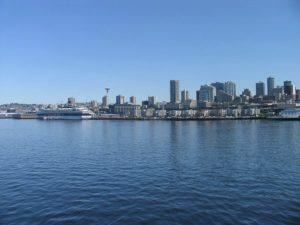 My wife Amy and I decided to go scuba diving in the Seattle-Tacoma area while visiting my daughter on her 21st birthday. We found shores of the Puget Sound easy to get to, fun to scuba dive, and the waters teaming with interesting creatures.
My wife Amy and I decided to go scuba diving in the Seattle-Tacoma area while visiting my daughter on her 21st birthday. We found shores of the Puget Sound easy to get to, fun to scuba dive, and the waters teaming with interesting creatures.
The Puget Sound has hundreds of shore diving locations. For planning, we picked three of the highest rated dive sites closest to the Seattle Tacoma Airport, just on the southern edge of Seattle: Redondo Beach, Saltwater State Park, and Three Tree Point. We used TL Sea Dive Shop to rent cylinders, it was only about 10 minutes away from the airport, and another 10 minutes away from our Airbnb location. The folks at TL Sea are awesome! We ordered 33% nitrox in advance, and used 100CF aluminum cylinders, which gave us about 45 minutes of bottom time at 75-90 feet. The Nitrox 100's worked out perfectly!
The water temperature in the Puget Sound is a consistent 56 degrees, we were undecided about using wet suits or dry suits. We settled on 7mm two-piece wet suits. Having no experience with that much neoprene in saltwater, our weights & buoyancy were a little off on the first dive. I gave Amy some extra weights, and for the second and third dives, I wore only the 7mm shorty (which was a little cool and refreshing!). As soon as the dive shop opened up again, I returned to get 10 more pounds. I can't say enough about how helpful the staff at TL Sea was, especially helping us pick dive sites and dive planning. For tides and currents, the staff instructor directed me to the "planmydive.com" website, which is very informative.
Redondo Beach
The Redondo Beach dive site is noted for easy access, public facilities, very small tidal factors, and can accommodate all experience levels from beginner to advanced/technical diving. It was an obvious choice for our first "acclimatization" dive. Amy wanted to try out a new camera, and we returned to Redondo Beach for her 'photography dive' with the new camera, and we returned again for our first Pacific Northwest night dive as well. Redondo Beach is perhaps one of the easiest shore diving locations I've ever been to.
A paid public parking lot across the street from the beach provided an excellent spot to gear up and conduct our pre-diving checks. The cost of parking was $6 for the whole day, but you can also pay in hourly increments. For our evening and night dives, the parking lot was full of divers with various portable tables and interesting equipment. Although we saw numerous divers the parking lot, we only encountered one other buddy team below the surface. The dive site was not crowded at all. After gearing up, we simply walked across the street using the cross walk and right into the water. There are numerous places to enter from, we picked a set of concrete stairs next to a pier.
Diving
From the surface to 85 feet, the water was clear and visibility was consistently about 20 feet. At depths below 85 feet, the light level drops off rapidly and having flashlights were very helpful. We saw schools of perch and rockfish, especially close to the pier by Salty's restaurant. Further out, we saw numerous varieties of anemones, sea cucumbers, and colorful crabs. A number of manmade formations such as sunken row boats, statues, etc. provided homes to all kinds of invertebrates, including an elusive red octopus.
Exit
We had dinner at Salty's after our afternoon dive as we waited for darkness for night diving. Although it is an upscale restaurant, they were very welcoming to a couple of scruffy scuba divers! The food was standard northwest coastal fair, I would recommend the blackened fish tacos.
Recommendation
If you are new to diving in the Pacific Northwest, or just passing through and want to squeeze in a couple of easy dives; Redondo Beach is a great place to start. It has something for all skill levels, incredibly easy access, and very good facilities. We also appreciated having other divers around the parking lot who happily gave us advice only local divers would know. TL Sea dive shop was most accommodating, and close! We will definitely be going back to TL Sea for our future dives in the Pacific Northwest.

